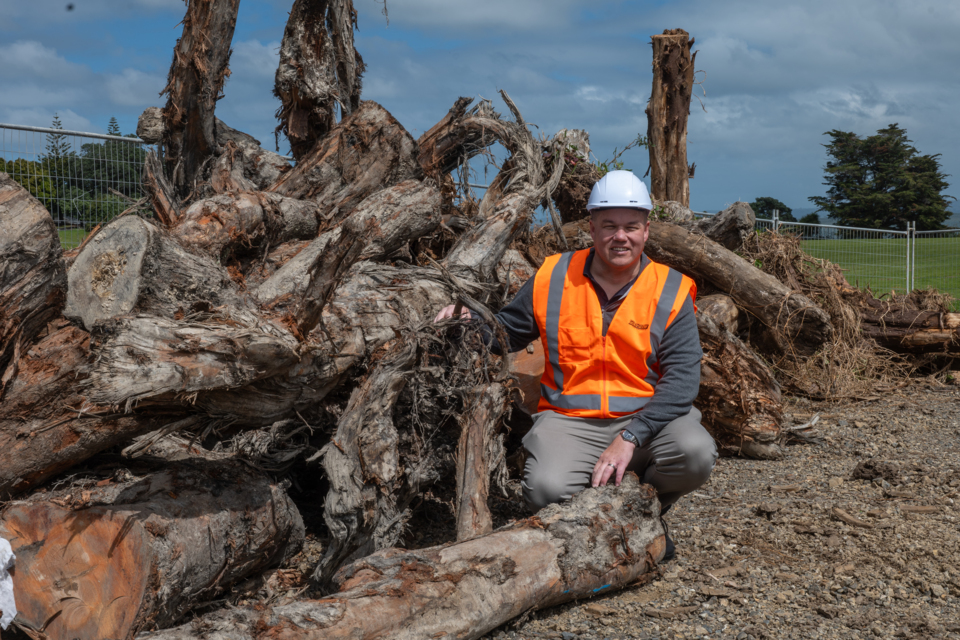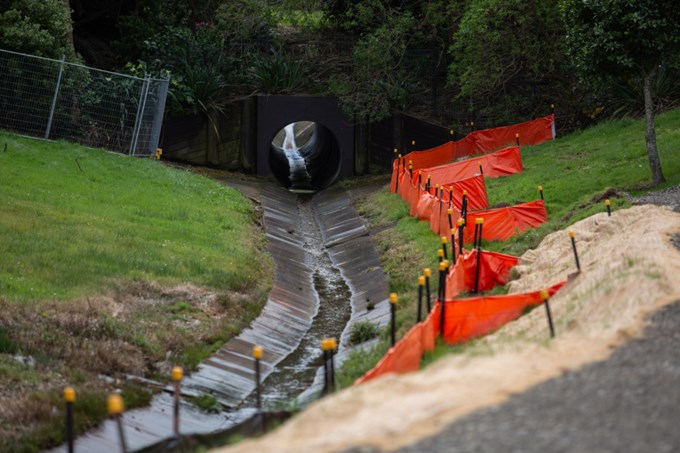Some of us have money in the bank - Glasgow Contractors has concrete, sandbags made from leftover FIFA Women’s World Cup, materials, sugar cane pegs and a host of other carbon-saving initiatives.
The Albany company is restoring a natural waterway to the Blackgate Reserve in Manurewa in an environmentally friendly way.
The 1600-hundred tonnes of concrete it’s removing from the reserve’s man-made channels goes to a facility in Wiri to be crushed at no cost to Auckland Council for use in future building projects, reducing their carbon footprints.
Glasgow director Ollie Ferrick says it’s all about building in a more sustainable way.
“If we didn’t have a relationship with that company it would be difficult to make carbon savings because we’d have to truck the concrete too far.”
Glasgow is so committed to reducing waste, it doesn’t even have skips, which it says encourage people to throw things away.
“All the pegs we are using are made from biodegradable sugarcane, logs we’ll use on the banks to create micro-climates come from storm-damage, and we’ve even worked with businesses near the site that can provide food in recyclable containers.
“And since our depot is 60kms away, we’ve worked with the Manurewa Leisure Centre, which will provide parking for our trucks, so we aren’t burning fuel making unnecessary trips up and down the motorway.”
They are all moves Manurewa-Papakura Ward Councillor Daniel Newman says will see the return of a natural waterway that will filter rainwater destined for the Manukau Harbour and return bird and aquatic life to the area.
“It’s a fantastic project with great ecological outcomes that support the natural environment as part of the larger Puhinui Stream regeneration programme.
“The stream runs from Totara Park through Wiri and Manukau and on to the Harbour.
“Access tracks are being created along either side of the stream and more planting will take place to create an improved natural environment.”

Trees brought down in this year's cyclone are being put to use to create living environments, rather than being dumped, chipped or turned into firewood.
Newman says it will be fantastic to return an environment that benefits fish and animal life.
“The naturalised stream will create micro-environments to benefit tuna (eels), aquatic life and native birds. The area will be more usable, all with built-in erosion and sediment control.”
He says Haumanu, which acts as a stream biodiversity offset bank where developers can use credits to offset their environmental impacts, is the way of the future.
“It’s a significant change and companies like Glasgow should be commended,” he says.
The programme calculates how many credits a developer needs to meet offset requirements, and trades them, with the income used to fund stream enhancement projects across the city.
Healthy Waters Haumanu spokesman Shaun McAuley says developers can use the programme if they have already tried to mitigate any adverse environmental effects from their projects.
“The resource consent process can require developers to provide offsets or compensation for their projects, and that can be quite hard for developers at their own properties, especially in built-up urban areas.”
Healthy Waters calculates credits using a system based around stream ecological values, and projected improvement values enabling Healthy Waters to fund stream enhancement projects that would not otherwise be funded.
“Our scheme allows developers to tap into a database of potential projects and use our knowledge of how to deliver stream offset projects.”
Ferrick says it’s much simpler than it sounds. “It’s about doing the right thing. Projects like Blackgate will always have an impact, but that doesn’t mean you can’t do everything practical to minimise that.
“The environment and the community both win using that approach.”
More about the Haumanu programme here.


